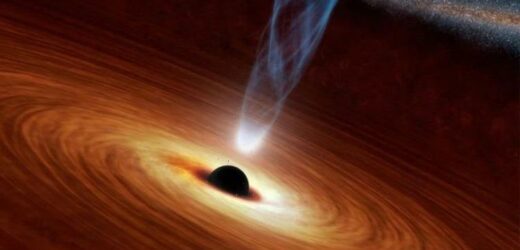Neil deGrasse Tyson reveals scientists ‘stumped’ over dark matter
We use your sign-up to provide content in ways you’ve consented to and to improve our understanding of you. This may include adverts from us and 3rd parties based on our understanding. You can unsubscribe at any time. More info
About 85 percent of all matter in the universe is accounted for by dark matter, and yet no one has ever proven the substance exists. Dark matter is considered “dark” precisely because it cannot be seen, it does not interact with any known form of radiation, and has so far escaped all known means of detection. And yet, scientists can see the effect dark matter has on the universe at large and have put forward a number of theories that might one day solve the cosmic conundrum.
One of these theories is the presence of so-called boson clouds circling black holes.
Bosons are a class of subatomic particles that are incredibly light and painstakingly hard to detect on Earth.
But a team of researchers in Australia and the LIGO-Virgo-KAGRA collaboration, has proposed a novel way of detecting clouds of these particles using gravitational waves – ripples in the very fabric of time and space.
In a new study pre-published on the arXiv server, researchers from The Australian National University (ANU) and the LIGO-Virgo-KAGRA collaboration have suggested searching for gravitational waves produced by possible boson clouds near rapidly spinning black holes.


Their study was touted as the world’s very first all-sky survey designed to look for this specific phenomenon.
Dr Lilli Sun, from the ANU Centre for Gravitational Astrophysics, said: “It is almost impossible to detect these ultralight boson particles on Earth.
“The particles, if they exist, have extremely small mass and rarely interact with other matter – which is one of the key properties that dark matter seems to have.
“Dark matter is material that cannot be seen directly, but we know that dark matter exists because of the effect it has on objects that we can observe.
“But by searching for gravitational waves emitted by these clouds we may be able to track down these elusive boson particles and possibly crack the code of dark matter.
Dark matter: Michio Kaku explains hypothetical substance
“Our searches could also allow us to rule out certain ultralight boson particles that our theories say could exist but actually don’t.”
If these boson clouds exist, gravitational wave detectors here on Earth should be able to pick up their gravitational signatures.
Detectors such as LIGO, have already detected the gravitational shockwaves of colliding black holes even though these events happened billions of light-years away.
Dr Sun said: “Gravitational-wave discoveries not only provide information about mysterious compact objects in the Universe, like black holes and neutron stars, they also allow us to look for new particles and dark matter.


“Future gravitational wave detectors will certainly open more possibilities.
“We will be able to reach deeper into the Universe and discover more insights about these particles.
“For example, the discovery of boson clouds using gravitational wave detectors would bring important insights about dark matter and help advance other searches for dark matter.
“It would also advance our understanding of particle physics more broadly.”
The study also shed new light on the likelihood of boson clouds existing in the Milky Way by taking into consideration their ages.
According to Dr Sun, the strength of a gravitational wave from a boson cloud will depend on the cloud’s age – the older they are, the weaker the signal.
She said: “The boson cloud shrinks as it loses energy by sending out gravitational waves.
“We learnt that a particular type of boson cloud younger than 1,000 years is not likely to exist anywhere in our galaxy, while clouds that are up to 10 million years old are not likely to exist within about 3,260 light-years from Earth.”
Source: Read Full Article


